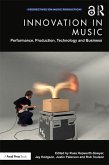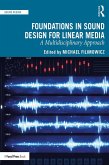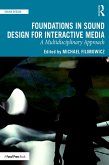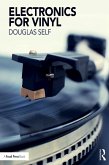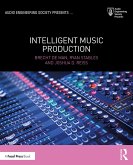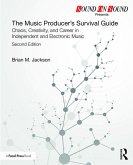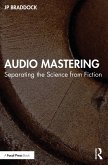Producing Music (eBook, PDF)
Redaktion: Hepworth-Sawyer, Russ; Marrington, Mark; Hodgson, Jay
45,95 €
45,95 €
inkl. MwSt.
Sofort per Download lieferbar

23 °P sammeln
45,95 €
Als Download kaufen

45,95 €
inkl. MwSt.
Sofort per Download lieferbar

23 °P sammeln
Jetzt verschenken
Alle Infos zum eBook verschenken
45,95 €
inkl. MwSt.
Sofort per Download lieferbar
Alle Infos zum eBook verschenken

23 °P sammeln
Producing Music (eBook, PDF)
Redaktion: Hepworth-Sawyer, Russ; Marrington, Mark; Hodgson, Jay
- Format: PDF
- Merkliste
- Auf die Merkliste
- Bewerten Bewerten
- Teilen
- Produkt teilen
- Produkterinnerung
- Produkterinnerung

Bitte loggen Sie sich zunächst in Ihr Kundenkonto ein oder registrieren Sie sich bei
bücher.de, um das eBook-Abo tolino select nutzen zu können.
Hier können Sie sich einloggen
Hier können Sie sich einloggen
Sie sind bereits eingeloggt. Klicken Sie auf 2. tolino select Abo, um fortzufahren.

Bitte loggen Sie sich zunächst in Ihr Kundenkonto ein oder registrieren Sie sich bei bücher.de, um das eBook-Abo tolino select nutzen zu können.
During the last two decades, the field of music production has attracted considerable interest from the academic community, more recently becoming established as an important and flourishing research discipline in its own right.
- Geräte: PC
- mit Kopierschutz
- eBook Hilfe
- Größe: 6.2MB
Andere Kunden interessierten sich auch für
![Innovation in Music (eBook, PDF) Innovation in Music (eBook, PDF)]() Innovation in Music (eBook, PDF)61,95 €
Innovation in Music (eBook, PDF)61,95 €![Foundations in Sound Design for Linear Media (eBook, PDF) Foundations in Sound Design for Linear Media (eBook, PDF)]() Foundations in Sound Design for Linear Media (eBook, PDF)50,95 €
Foundations in Sound Design for Linear Media (eBook, PDF)50,95 €![Foundations in Sound Design for Interactive Media (eBook, PDF) Foundations in Sound Design for Interactive Media (eBook, PDF)]() Foundations in Sound Design for Interactive Media (eBook, PDF)49,95 €
Foundations in Sound Design for Interactive Media (eBook, PDF)49,95 €![Electronics for Vinyl (eBook, PDF) Electronics for Vinyl (eBook, PDF)]() Douglas SelfElectronics for Vinyl (eBook, PDF)56,95 €
Douglas SelfElectronics for Vinyl (eBook, PDF)56,95 €![Intelligent Music Production (eBook, PDF) Intelligent Music Production (eBook, PDF)]() Brecht De ManIntelligent Music Production (eBook, PDF)45,95 €
Brecht De ManIntelligent Music Production (eBook, PDF)45,95 €![The Music Producer's Survival Guide (eBook, PDF) The Music Producer's Survival Guide (eBook, PDF)]() Brian M. JacksonThe Music Producer's Survival Guide (eBook, PDF)51,95 €
Brian M. JacksonThe Music Producer's Survival Guide (eBook, PDF)51,95 €![Audio Mastering (eBook, PDF) Audio Mastering (eBook, PDF)]() Jp BraddockAudio Mastering (eBook, PDF)40,95 €
Jp BraddockAudio Mastering (eBook, PDF)40,95 €-
-
-
During the last two decades, the field of music production has attracted considerable interest from the academic community, more recently becoming established as an important and flourishing research discipline in its own right.
Dieser Download kann aus rechtlichen Gründen nur mit Rechnungsadresse in A, B, BG, CY, CZ, D, DK, EW, E, FIN, F, GR, HR, H, IRL, I, LT, L, LR, M, NL, PL, P, R, S, SLO, SK ausgeliefert werden.
Produktdetails
- Produktdetails
- Verlag: Taylor & Francis
- Seitenzahl: 356
- Erscheinungstermin: 28. März 2019
- Englisch
- ISBN-13: 9781351815109
- Artikelnr.: 56139034
- Verlag: Taylor & Francis
- Seitenzahl: 356
- Erscheinungstermin: 28. März 2019
- Englisch
- ISBN-13: 9781351815109
- Artikelnr.: 56139034
- Herstellerkennzeichnung Die Herstellerinformationen sind derzeit nicht verfügbar.
Russ Hepworth-Sawyer started life as a sound engineer and occassional producer. He has over two decades' experience of all things audio. Russ is a member of the Audio Engineering Society and co-founder of the UK Mastering Section there. A former board member of the Music Producers Guild, Russ helped form their Mastering Group. Through MOTTOsound (www.mottosound.co.uk), Russ now works freelance in the industry as a mastering engineer, writer, and consultant. Russ currently lectures part-time for York St John University and has taught extensively in higher education at institutions including Leeds College of Music, London College of Music, and Rose Bruford College. He contributes from time to time in magazines such as MusicTech, Pro Sound News Europe, and Sound on Sound. He has also written many titles for Focal Press and Routledge. Russ is the co-founder of the Innovation in Music conference series (www.musicinnovation.co.uk) and also of the Perspectives on Music Production series of academic books. Jay Hodgson is on faculty at Western University, where he primarily teaches courses on songwriting and project paradigm record production. He is also one of two mastering engineers at MOTTOsound, a boutique audio services house situated in England. In the last few years, Dr. Hodgson's masters have twice been nominated for Juno Awards and topped Beatport's global techno and house charts, and he has contributed music to films recognized by the likes of Rolling Stone magazine and which screened at the United Nations General Assembly. He was awared a Governor General's academic medal in 2006, primarily in recognition of his research on audio recording, and his second book, Understanding Records (2010), was recently acquired by the Reading Room of the Rock and Roll Hall of Fame. He has other books published and forthcoming from Oxford University Press, Bloomsbury, Continuum, Wilfrid Laurier University Press, Focal Press, and Routledge. Mark Marrington trained in composition and musicology at the University of Leeds (MMus, PhD) and is currently a senior lecturer in music production at York St John University. He has previously held teaching positions at Leeds College of Music and the University of Leeds (School of Electronic and Electrical Engineering). Mark has published chapters with Cambridge University Press, Bloomsbury Academic, Routledge, and Future Technology Press and has contributed articles to British Music, Soundboard, the Musical Times, and the Journal on the Art of Record Production. Since 2010, his research has been focused on a range of music production topics with a particular emphasis on the role of digital technologies in music creation and production. Other interests include songwriting, music technology pedagogy, the contemporary classical guitar, and British classical music in the 20th century. His most recent research has been concerned with the aesthetics of classical music recording and a forthcoming monograph on the role of recordings in shaping the identity of the classical guitar in the 20th century.
Contributor Biographies
1 Introduction - Russ Hepworth-Sawyer, Jay Hodgson, and Mark Marrington
PART 1- Music Production and Genre
2 Socio-Technical Networks and Music Production Competencies: Towards an
Actor Network Theory of Hip Hop Beat-Making - Matt Shelvock
3 Boom Bap Ex Machina: Hip-Hop Aesthetics and the Akai APC - Michail
Exarchos (A.K.A. Stereo Mike)
4 The DAW, Electronic Music Aesthetics, and Genre Transgression in Music
Production: The Case of Heavy Metal Music - Mark Marrington
5 Antonio Carlos Jobim: the Author as Producer - Marcio Pinho and Rodrigo
Vicente
6 Compost Listening: Vaporwave and the Dissection of Record Production -
Josh Ottum
7 Classical Production: Situating Historically Informed Performances in
Small Rooms - Robert Toft
PART 2- Music Production and Technology
8 The Politics of Digitizing Analogue Recording Technologies - Pat O'Grady
9 Producing Music for Immersive Audio Experiences -Rob Lawrence
10 Producing 3-D Audio - Justin Paterson and Gareth Llewellyn
11 Popular Music Production in Laptop Studios: Creative Workflows as
Problem-Solving Within Ableton Live - Thomas Brett
12 Real-Time, Remote, Interactive Recording Sessions: Music Production
Without Boundaries -Zack Moir, Paul Ferguson, and Gareth Dylan Smith
13 Tracking with Processing and Coloring as You Go- Austin Moore
PART 3- Concepts of Production
14 Working with Sound in the DAW: Towards a New Materiality of the
Audio-Object - Stace Constantinou
15 Coproduction: Towards a Typology of Collaborative Practice in Music
Production - Robert Wilsmore
16 Narrative and the Art of Record Production - Alexander C. Harden
PART 4 - The Context of Production
17 "Clever" Tools and Social Technologies: To What Extent Does Wider Access
to Technology Necessitate a Step Change in Approaches to Teaching Music
Production? - Alex Baxter
18 Contemporary Production Success: A Roundtable Discussion With Mid-Career
Music Production Professionals - Russ Hepworth-Sawyer
19 Conversations With Women in Music Production - Kallie Marie
Index
1 Introduction - Russ Hepworth-Sawyer, Jay Hodgson, and Mark Marrington
PART 1- Music Production and Genre
2 Socio-Technical Networks and Music Production Competencies: Towards an
Actor Network Theory of Hip Hop Beat-Making - Matt Shelvock
3 Boom Bap Ex Machina: Hip-Hop Aesthetics and the Akai APC - Michail
Exarchos (A.K.A. Stereo Mike)
4 The DAW, Electronic Music Aesthetics, and Genre Transgression in Music
Production: The Case of Heavy Metal Music - Mark Marrington
5 Antonio Carlos Jobim: the Author as Producer - Marcio Pinho and Rodrigo
Vicente
6 Compost Listening: Vaporwave and the Dissection of Record Production -
Josh Ottum
7 Classical Production: Situating Historically Informed Performances in
Small Rooms - Robert Toft
PART 2- Music Production and Technology
8 The Politics of Digitizing Analogue Recording Technologies - Pat O'Grady
9 Producing Music for Immersive Audio Experiences -Rob Lawrence
10 Producing 3-D Audio - Justin Paterson and Gareth Llewellyn
11 Popular Music Production in Laptop Studios: Creative Workflows as
Problem-Solving Within Ableton Live - Thomas Brett
12 Real-Time, Remote, Interactive Recording Sessions: Music Production
Without Boundaries -Zack Moir, Paul Ferguson, and Gareth Dylan Smith
13 Tracking with Processing and Coloring as You Go- Austin Moore
PART 3- Concepts of Production
14 Working with Sound in the DAW: Towards a New Materiality of the
Audio-Object - Stace Constantinou
15 Coproduction: Towards a Typology of Collaborative Practice in Music
Production - Robert Wilsmore
16 Narrative and the Art of Record Production - Alexander C. Harden
PART 4 - The Context of Production
17 "Clever" Tools and Social Technologies: To What Extent Does Wider Access
to Technology Necessitate a Step Change in Approaches to Teaching Music
Production? - Alex Baxter
18 Contemporary Production Success: A Roundtable Discussion With Mid-Career
Music Production Professionals - Russ Hepworth-Sawyer
19 Conversations With Women in Music Production - Kallie Marie
Index
Contributor Biographies
1 Introduction - Russ Hepworth-Sawyer, Jay Hodgson, and Mark Marrington
PART 1- Music Production and Genre
2 Socio-Technical Networks and Music Production Competencies: Towards an
Actor Network Theory of Hip Hop Beat-Making - Matt Shelvock
3 Boom Bap Ex Machina: Hip-Hop Aesthetics and the Akai APC - Michail
Exarchos (A.K.A. Stereo Mike)
4 The DAW, Electronic Music Aesthetics, and Genre Transgression in Music
Production: The Case of Heavy Metal Music - Mark Marrington
5 Antonio Carlos Jobim: the Author as Producer - Marcio Pinho and Rodrigo
Vicente
6 Compost Listening: Vaporwave and the Dissection of Record Production -
Josh Ottum
7 Classical Production: Situating Historically Informed Performances in
Small Rooms - Robert Toft
PART 2- Music Production and Technology
8 The Politics of Digitizing Analogue Recording Technologies - Pat O'Grady
9 Producing Music for Immersive Audio Experiences -Rob Lawrence
10 Producing 3-D Audio - Justin Paterson and Gareth Llewellyn
11 Popular Music Production in Laptop Studios: Creative Workflows as
Problem-Solving Within Ableton Live - Thomas Brett
12 Real-Time, Remote, Interactive Recording Sessions: Music Production
Without Boundaries -Zack Moir, Paul Ferguson, and Gareth Dylan Smith
13 Tracking with Processing and Coloring as You Go- Austin Moore
PART 3- Concepts of Production
14 Working with Sound in the DAW: Towards a New Materiality of the
Audio-Object - Stace Constantinou
15 Coproduction: Towards a Typology of Collaborative Practice in Music
Production - Robert Wilsmore
16 Narrative and the Art of Record Production - Alexander C. Harden
PART 4 - The Context of Production
17 "Clever" Tools and Social Technologies: To What Extent Does Wider Access
to Technology Necessitate a Step Change in Approaches to Teaching Music
Production? - Alex Baxter
18 Contemporary Production Success: A Roundtable Discussion With Mid-Career
Music Production Professionals - Russ Hepworth-Sawyer
19 Conversations With Women in Music Production - Kallie Marie
Index
1 Introduction - Russ Hepworth-Sawyer, Jay Hodgson, and Mark Marrington
PART 1- Music Production and Genre
2 Socio-Technical Networks and Music Production Competencies: Towards an
Actor Network Theory of Hip Hop Beat-Making - Matt Shelvock
3 Boom Bap Ex Machina: Hip-Hop Aesthetics and the Akai APC - Michail
Exarchos (A.K.A. Stereo Mike)
4 The DAW, Electronic Music Aesthetics, and Genre Transgression in Music
Production: The Case of Heavy Metal Music - Mark Marrington
5 Antonio Carlos Jobim: the Author as Producer - Marcio Pinho and Rodrigo
Vicente
6 Compost Listening: Vaporwave and the Dissection of Record Production -
Josh Ottum
7 Classical Production: Situating Historically Informed Performances in
Small Rooms - Robert Toft
PART 2- Music Production and Technology
8 The Politics of Digitizing Analogue Recording Technologies - Pat O'Grady
9 Producing Music for Immersive Audio Experiences -Rob Lawrence
10 Producing 3-D Audio - Justin Paterson and Gareth Llewellyn
11 Popular Music Production in Laptop Studios: Creative Workflows as
Problem-Solving Within Ableton Live - Thomas Brett
12 Real-Time, Remote, Interactive Recording Sessions: Music Production
Without Boundaries -Zack Moir, Paul Ferguson, and Gareth Dylan Smith
13 Tracking with Processing and Coloring as You Go- Austin Moore
PART 3- Concepts of Production
14 Working with Sound in the DAW: Towards a New Materiality of the
Audio-Object - Stace Constantinou
15 Coproduction: Towards a Typology of Collaborative Practice in Music
Production - Robert Wilsmore
16 Narrative and the Art of Record Production - Alexander C. Harden
PART 4 - The Context of Production
17 "Clever" Tools and Social Technologies: To What Extent Does Wider Access
to Technology Necessitate a Step Change in Approaches to Teaching Music
Production? - Alex Baxter
18 Contemporary Production Success: A Roundtable Discussion With Mid-Career
Music Production Professionals - Russ Hepworth-Sawyer
19 Conversations With Women in Music Production - Kallie Marie
Index

